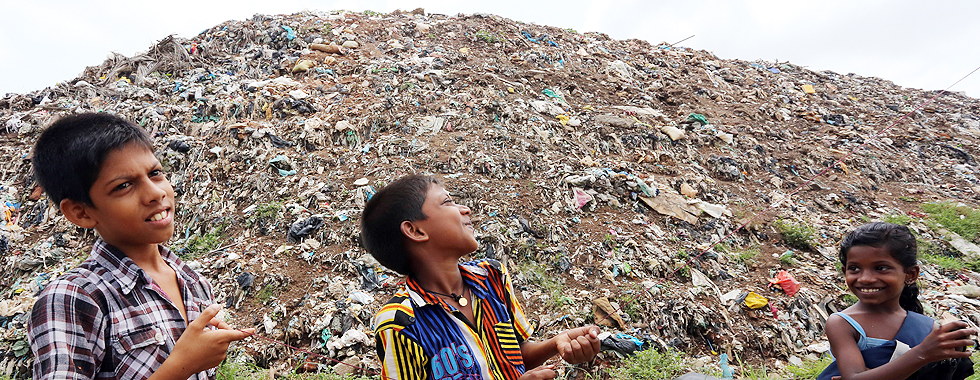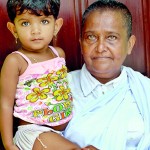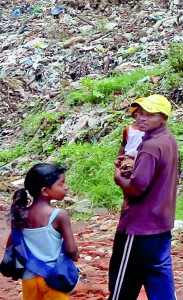News
Authorities’ promises stink as much as garbage mountain
As garbage piles from hillocks to mountain levels, residents in Meethotumulla, Kolonnawa blame authorities for not keeping any of a string of promises to prevent disturbing health hazards.
They condemn government plans to keep Kolonnawa as a collection depot from which refuse would be transported to Puttalam for disposal.

Growing up amidst garbage: These children are all smiles but face severe health hazards. Pix by M.A. Pushpa Kumara
Meanwhile the Kolonnawa Urban Council Chairman Ravindra Udayashantha – who this week faced a petition brought against him by several council members – simply remarked that people faced garbage problems all over the country.
As homes overshadowed by the mountains of waste crack and become uninhabitable he said, “Residents cry out because one or two houses will be broken but I’m not against the new (Puttalam) project. People should also contribute and make sacrifices to overcome this situation as this is a national problem,” he said.
Illness and disease is rife in the stinking area.
R.S. Menike, 58, has been living in the area for the past 30 years. She was there when the garbage were dumped first several metres behind her house. Now the refuse dump is 10 times taller than her house and casts a shadow over everyone near it.
Menike rarely opens the doors and windows of her house now after her grand-daughter went down with dengue fever – one of many in the area to suffer the illness.
“We can’t even go and observe sil in our temple. Crows drop chicken parts and limbs of other animals in the middle of the temple. It is very sad to see a place of worship soiled by people’s waste,” she said.

K. Keerthiratne Perera
Residents have launched several protests to discontinue dumping of garbage in the area but the authorities fail to act as there is no proper disposal site in the country.
Thirty-two-year-old T. Francis and his family are used to the foul smell and call of crows that greet them each morning from the mountain of garbage outside. But this week has been one of the worst, he said,
Francis’s eight-year-old daughter, has not gone to school for two weeks in a row. This is normal for children in the area. Her 11-year-old brother, Pasindu, suffered high fever and, after being admitted to hospital, was diagnosed with dengue fever. It has been several days now but Pasindu’s health has not improved.

R.S. Menike: Witnessed the metamorphosis of the garbage dump
“Life here is dreadful. My children are always sick. Most of the time I stay home looking after them and there are months I do not get paid at all,” said Francis. The previous month was one such period of unemployment. Francis works as a labourer for a private company and his wife is a housewife.
Their misery grew when their unsafe home was demolished by the government. Since he was not given an alternative dwelling his family had to move to a house also marked for demolition – its owners were evacuated last month.
Such residents are given Rs. 10,000 to rent a house and have been promised new homes worth Rs. 750,000.
“We were promised of better times but even if my children die of sicknesses these politicians wouldn’t bat an eyelid,” Francis said.
According to the Colombo Municipal Council (CMC) 600,000 people arrive in Colombo from all parts of the country daily. During the daytime a population of one million to 1.5 million inhabits the capital city. They leave more than 750 tons of garbage each day, the CMC said. The Kolonnawa Council Chairman says the figure tops 900 tons, all collected and dumped out of sight at Meethotamulla.

Francis with his daughter: This week the stench has been unbearbale
This place is also home to more than 1000 families. Breathing toxic air emitted from the waste and battling against all odds with endless diseases they have been living a nightmare for the past 20 years.
Making matters worse, last year, several houses started breaking as a result of the weight of the disposal and gas emissions from the rotting refuse. The gases are toxic.
“As the garbage increases the houses arebreaking up, some because of the garbage and some as a result of government demolition, and people are made to leave.
“We are fed up with going to various parties and explaining our position because although promises have been given nothing is being done,” said resident Sujith Perera, 29.
He said that when it rains the situation is worse. Juices of rotting food, hospital discharge and other poisonous substances flow into houses with the rainwater. The smell is the worst, he said, and then the diseases. Dengue is the most common.
Needless to say the area a breeding spot for rats, crows, cockroaches and other types of insects and reptiles as food is ample here.
The local children’s education is also being affected. Of the 100-odd students enrolled at Meethotamulla Sri Rahula Primary School only 50-60 at a time attend daily classes, the Principal, P. Withana said.
She said that this was because the students were constantly falling sick. Respiratory illnesses and rashes were common. A large number of students dropped out of school each year.
A protest, “Fighting for a garbage-free future”, was launched by the People’s Movement against the Meethotamulla, Kolonnawa Garbage Dump on June 28. Although the villagers gathered “to protest till the issue is solved” they were dispersed by authorities promising a fast solution.
Dump on June 28. Although the villagers gathered “to protest till the issue is solved” they were dispersed by authorities promising a fast solution.
“Last year when houses started breaking we protested and asked relevant authorities to stop dumping garbage here. We were promised that this would happen on December 31, 2013. Since the dumping did not stop we protested again on February 22 this year,” said the convener of the movement, K. Keerthiratne Perera.
Following this, a meeting headed by Defence Secretary Gotabaya Rajapaksa took place on February 24. Here, participants were informed of a new project to dispose of the waste in Puttalam. The garbage collected in Kolonnawa is to be transported in three trains to the soon-to-be-constructed disposal plant in Aruakkalu, Puttalam.
Mr. Perera said this was not the answer residents sought. “This does not solve our problem. We do not want the garbage to be collected here. We need to breathe fresh air like we did 20 years ago,” he said, adding that if the government failed to discontinue disposing garbage by next month the residents will launch a massive protest and fight until they are provided with a favourable solution.
Meanwhile Jagath Gunawardena, lawyer specialising in environmental issues, said that under government ordinance the CMC and Kolonnawa Municipal Council are responsible for eradicating a public nuisance.
“They have a statutory obligation to stop this and take action. This is a hazardous open dump and they have to take steps to dispose of the garbage in a proper manner,” he said adding that if the authorities failed to do so, affected parties could take them to court.
The Commissioner to the CMC, Bhadrani Jayawardena, said that if the authorities took action several years ago to find a proper disposal site the situation wouldn’t have escalated. She said that the CMC had initiated several projects to resolve the matter.
“We have started to separate the garbage and recycle plastic and glass. You can see this happening in the Vihara Maha Devi Park. People are not talking about these initiatives,” she said.
The waste disposal problem is not limited to Colombo. Lately the city’s suburbs have started showing early signs of a crisis.
Garbage in these areas is disposed of at a dumping site at Karadiyana. The Borelesgamuwa Urban Council also dumps its garbage here. Its Chairman, Anura Priyantha, said there were problems.
“We informed the Western Province Waste Management Authority about the problems but since we do not have a permanent place we continue to dump the garbage in Karadiyana,” he said adding that they are seeking a better solution to the issue of increasing garbage.
The Deputy Chairman of Kesbewa Urban Council, Hemal Devapriya, said that soon Kesbewa will also be affected by the problem. “We see this in several other areas. In Karadiyana a part of the garbage is recycled or composted but a large part still remains. In the future we will not have space to dump our garbage. It will be a big issue then,” he said.
| Council members taking dirty money
Some council members are gaining financially from the dumping of garbage at Kolonnawa and are blocking any resolution of the issue, according to the Deputy Chairman of the Kolonnawa Urban Council, H. B. Suresh Kodagoda, He referred to the illegal practice of dumping waste at Kolonnawa from areas other than Colombo and Kolonnawa. “To this certain parties of the council give a receipt although this is illegal. They take a large amount of money from these parties. Though the public complains nothing will be done about it until this business is stopped,” he said.
Puttalam not the answer The proposed Puttalam project is not the answer to the country’s garbage problems says the Executive Director of Center for Environmental Justice, Hemantha Withanage. Aruakkalu in Puttalam is an archeological site and also a fresh water aquifer that is important to the country. It will also be highly expensive to transport garbage every day to the site, he added. “What we need is a permanent sanitary site in which to dispose garbage. Taking the issue off Kolonnawa and dumping it on people in Puttalam is not the answer,” he said. “In 2013 the government said that only sorted garbage will be collected. This was not successful because only few areas are still doing it. Then again they started a project called ‘Waste for Energy’. Again, this is not a successful project because there is moisture in our garbage which makes it impossible to make energy with,” Mr. Withanage said. “The public is equally responsible for the increasing garbage problem. But without a proper recycling mechanism it is useless for residents to sort their garbage,” he said. |

